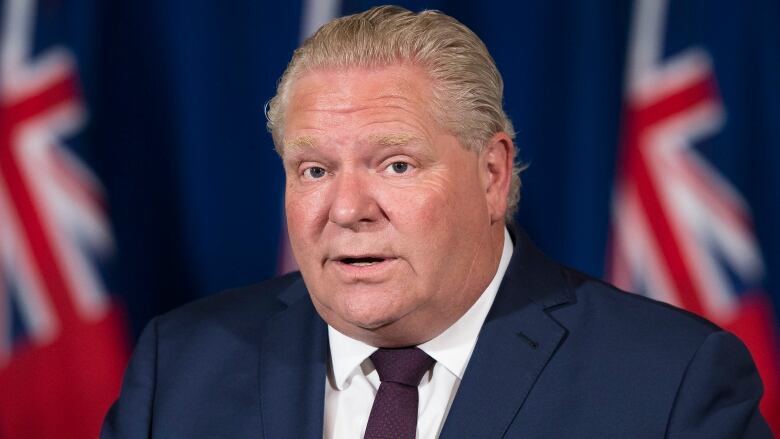Toronto election was 'free and fair' despite council seat slash, Ford government tells top court
City says province trampled democracy when it slashed city council mid-election

The Ford government's legal team told the Supreme Court of Canada on Tuesday that Toronto's last election was "free and fair," despite allegations from the city that the province trampled democracy when it slashed the size of city council.
Ontario passed legislation partway through the 2018 municipal campaign, cutting the number of Toronto council seats from 47to 25.
Critics, councillors and candidates pushed back on Premier Doug Ford's decision, which has beenwinding its way through the legal system ever since.
During a Supreme Court hearing on Tuesday, lawyers representing the city and other intervenors suggested Ontario's Bill 5 was "profoundly undemocratic" a move that pulled the rug out from under candidates trying to run.
Bill violated constitutional rights, city argued
In a submission to the top court on March 10, the city saidthe move three years ago violated the constitutional rights of Toronto's electoral candidates and voters.
But in its filing with the Supreme Court, Ontario said in the run-up to the 2018 election, voters and candidates had all the necessary information on everyone who was running in each ward.
At the time, Ford said the move would improve decision-making and save $25 million. Critics accused him of political interference and flouting democracy.
A provincial judge found the law unconstitutional, saying it infringed on the free-expression rights of candidates by affecting their ability to campaign, and those of voters by denying them the right to cast a ballot that could result in effective representation.

Ford then announced plans to use the Constitution's notwithstanding clause to forge ahead with the move. The clause gives provincial legislatures and Parliament the ability to usher in legislation that effectively overrides provisions in the Charter of Rights and Freedoms, but only for a five-year period.
However, Ford did not have to resort to the rarely used step.
The Ontario Court of Appeal for Ontario issued an interim stay of the initial court decision and the election took place with 25 wards and the revised boundaries.
The appeal court overturned the initial ruling in 2019, saying the frustration of candidates in facing altered electoral circumstances unanticipated rivals, losing allies and needing to reach new voters did not prevent them from saying anything they wished to say about matters at issue in the election or in promoting their candidacies.
Crowd gathered virtually to see battle play out
A crowd gathered virtually on Tuesday to see the battle play out at the Supreme Court.
"I'm finding a lot of hope in everybodywho's joining in to watch this online," said Chiara Padovani, who was acouncil candidate in 2018.
"Sometimes the rules get broken by the people in power. And what it means is that it's us,it's people like every single one of you on this call, who make that change happen."
Amber Morley, who is also a former council candidate, said the province's move reflects a larger issue of power imbalance.
"I think it really paints a picture of how unfair and difficult it is to get into a position of power as a person coming from the margins, as a woman, as someone who's racialized," she said, adding that Toronto is "far behind" when it comes to equality.
"There's lot of work that needs to happen in order for us to create a more equitable, diverse and prosperous society for all of us."

Speaking to reporters on Tuesday, Ford said he stands by his decision, saying it has made it more feasible to get bills passed through Toronto City Council.
"I haven't heard a councillor that's really disagreed with it," Ford said, but added that he was "sure there was a few."
"No one out there should want more politicians, I'll tell you that."
He even said some former critics now agree.
"I remember I was listening to the radio one day and someone who was dead against, councillor Shelley Carroll, agreed it was the right decision I almost hit a telephone polewhen I heard that one," he said.
But that's notexactly true, the councillor told CBC Toronto, adding that Ford has "very much over-interpreted" her stance.
"The case is about whether or not once an election has begun should a municipality be able to continue with that case," Carroll said, who represents Ward 17 Don Valley North.
"It's not about whether 25 or 47 is the magic number,it's about the rights of the municipality to go through due process and determine that number."
Ruling could have a lasting impact, councillor says
Since the election in 2018, Carroll said there's been a "continuing scar" for all of those who have been involved.
And with the nextToronto election just around the corner in 2022, Carroll said the court challenge could have a lasting impact.
"This has implications for every future election, in every municipality, in the nation of Canada because we're all creatures of our provinces," she said.
"What's important iswe should be allowed to start an election and know that the premier, if he just doesn't like the field of candidates thus far or how things are going, he [can't]change things, mid-election."
It is unclear when the Supreme Court will make a decision on the case.
With files from Lauren Pelley, Julia Knope and The Canadian Press












_(720p).jpg)


 OFFICIAL HD MUSIC VIDEO.jpg)
.jpg)



























































































